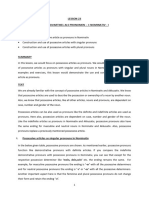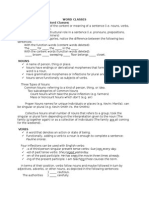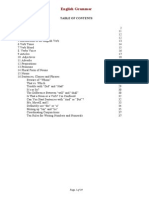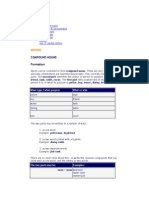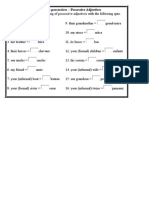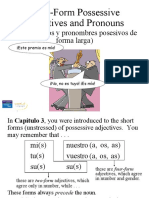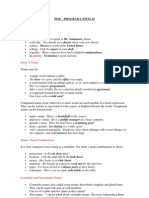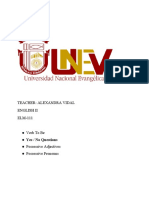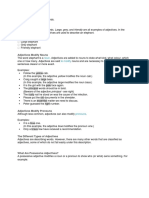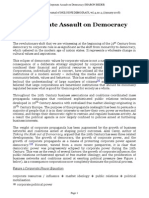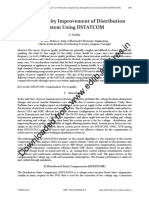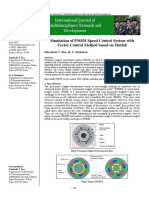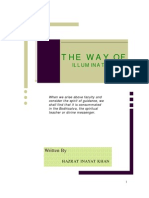Pronombres y Adjetivos Posesivos
Pronombres y Adjetivos Posesivos
Uploaded by
Anca CiobanuCopyright:
Available Formats
Pronombres y Adjetivos Posesivos
Pronombres y Adjetivos Posesivos
Uploaded by
Anca CiobanuOriginal Description:
Copyright
Available Formats
Share this document
Did you find this document useful?
Is this content inappropriate?
Copyright:
Available Formats
Pronombres y Adjetivos Posesivos
Pronombres y Adjetivos Posesivos
Uploaded by
Anca CiobanuCopyright:
Available Formats
Pronombres y adjetivos posesivos/ Possessive pronouns and adjectives Possessives identify the person to whom something belongs to.
They denote ownership or possession. When an unstressed possessive adjective (mi/my, tu/your, nuestro/our, su/ his, her) functions as a noun, it is called a possessive pronoun (m o/mine, tuyo/yours, nuestro/ours, suyo/his, hers). !emember that possessive pronouns and stressed possessive adjectives have the same form. ADJETIVOS POSESIVOS/ Possessive adjective "n #panish, there are $ types of possessive adjectives% the unstressed and the stressed. &nstressed possessive adjectives are placed before the nouns they modify. #ingular mi, tu, su, nuestro, nuestra, vuestro, vuestra Plural mis, tus, sus, nuestros, nuestras, vuestros, vuestras 'i, tu, su agree in number with the item possessed and not with the owner. They do ()T change with gender. 'i casa es blanca. / 'y house is white. 'is casas son blancas./ 'y houses are white. Tu amigo es *uan./ +our friend is *uan. Tus amigos son *uan y ,na./ +our friends are *uan and ,na. #u madre es la jefa./ -is mother is the boss. #us padres son los jefes./ -is parents are the bosses. (uestro and vuestro agree with the items possessed in both number and gender. (uestro jefe (*uan) es trabajador./ )ur boss (*uan) is hard.wor/ing. (uestros jefes (*uan y ,na) son trabajadores./ )ur bosses (*uan and ,na) are hard. wor/ing. (uestra jefa (,na) es trabajadora./ )ur boss (,na) is hard.wor/ing. (uestras jefas (#ilvia y ,na) son trabajadoras./ )ur bosses (#ilvia and ,na) are hard. wor/ing. #u and sus mean several different things0 therefore, the following constructions are used for clarification% su auto el auto de 1l his car el auto de ella her car el auto de &d. your car el auto de ellos their car el auto de ellas their car el auto de &ds. your car #us autos los autos de 1l his cars los autos de ella her cars los autos de &d. your cars los autos de ellos their cars los autos de ellas their cars los autos de &ds. your cars
#tressed possessive adjectives The stressed possessive adjectives follow the noun and agree in number and gender with the noun they modify or replace. Pos. ,dj. #ingular Plural 'asc. 2em. 'asc. 2em. my m o m a m os m as your tuyo tuya tuyos tuyas his, her, your suyo suya suyos suyas our nuestro nuestra nuestros nuestras their, your suyo suya suyos suyas &n colega m o habla./ , colleague of mine tal/s. 3a hija m a gan4./ 'y own daughter won. ()T5% "n the e6amples above, articles are used. This form adds emphasis to ownership. "n 5nglish, emphasis is e6pressed with intonation. P!)()'7!5# P)#5#"8)#/ Possessive Pronouns Pronouns agree in gender and number with the nouns they replace. 2urthermore, possessive pronouns are generally used with the corresponding definite article. Pos. ,dj. #ingular Plural 'asc. 2em. 'asc. 2em. mine m o m a m os m as yours tuyo tuya tuyos tuyas his, hers, yours suyo suya suyos suyas ours nuestro nuestra nuestros nuestras theirs, yours suyo suya suyos suyas #u proyecto cost4 poco dinero0 el nuestro cost4 much simo./ +our project costs little money0 ours costs much more. 2)!',# (5&T!,#/ (euter forms (euter forms e6press an idea or concept, lo m o, lo tuyo, lo suyo, lo nuestro, lo suyo. 3o suyo no tiene cura./ +ours does not have a cure.
You might also like
- Personal Pronouns: Singular PluralDocument17 pagesPersonal Pronouns: Singular PluralAsad AliNo ratings yet
- Possessive SDocument4 pagesPossessive Srenjithas2005No ratings yet
- The Pronoun: According To Content and Functions, Pronouns Fall IntoDocument6 pagesThe Pronoun: According To Content and Functions, Pronouns Fall IntoAdelinatoaderNo ratings yet
- Parts of SpeechDocument11 pagesParts of SpeechPavan KumarNo ratings yet
- Possessivartikel Im Nominativ - IDocument5 pagesPossessivartikel Im Nominativ - IdheerajsgaurNo ratings yet
- Pronoun and Antecedent AgreementDocument31 pagesPronoun and Antecedent AgreementJC Chavez100% (1)
- Possessivartikel Als Pronomen - I Nominativ - IDocument4 pagesPossessivartikel Als Pronomen - I Nominativ - IdheerajsgaurNo ratings yet
- German Possessive Pronouns Your Essential Guide IDocument1 pageGerman Possessive Pronouns Your Essential Guide ImaheshNo ratings yet
- Types of AdjectivesDocument4 pagesTypes of AdjectivesunderunderNo ratings yet
- There Are 7 Different Types of German PronounsDocument14 pagesThere Are 7 Different Types of German Pronounsblogger1234asNo ratings yet
- Verbal Notes Grammar BookDocument168 pagesVerbal Notes Grammar BookkrishunblackNo ratings yet
- Possessivartikel Im Akkusativ - IIDocument5 pagesPossessivartikel Im Akkusativ - IIdheerajsgaurNo ratings yet
- Articles, Determiners, and QuantifiersDocument10 pagesArticles, Determiners, and QuantifiersGothicAnkhNo ratings yet
- FRE 301 Adjectif PossessifDocument10 pagesFRE 301 Adjectif Possessiftmarytaylor224No ratings yet
- (Beginning Latin Nouns and Adjectives) Gender, Number, and Case: Why Do I Care?Document3 pages(Beginning Latin Nouns and Adjectives) Gender, Number, and Case: Why Do I Care?pm5rNo ratings yet
- Serbian Possessive PronounsDocument4 pagesSerbian Possessive PronounsmyrmomNo ratings yet
- Word ClassesDocument3 pagesWord Classesapi-266902206No ratings yet
- Pronouns NotesDocument29 pagesPronouns NotesJayanth SamavedamNo ratings yet
- Singular Plural Nom. Obl. Nom. OblDocument4 pagesSingular Plural Nom. Obl. Nom. ObltrapezundNo ratings yet
- Sentence Structure: Parts of SpeechDocument34 pagesSentence Structure: Parts of SpeechChiera FayeNo ratings yet
- Grammar WorksheetsDocument41 pagesGrammar WorksheetsGary Dennis David100% (2)
- Pronouns and NumeralsDocument14 pagesPronouns and NumeralsIonuţ Nucă100% (1)
- Dativ - IiiDocument6 pagesDativ - IiidheerajsgaurNo ratings yet
- Gender and Noun Formation Gender: Masculine, Feminine, Personal, and NeuterDocument15 pagesGender and Noun Formation Gender: Masculine, Feminine, Personal, and NeuterPetronela PavalucaNo ratings yet
- English GrammarDocument39 pagesEnglish GrammarkskkingNo ratings yet
- German Grammar and UsageDocument72 pagesGerman Grammar and UsageClaudia Mgaidia100% (4)
- Introduction To Linguistics - KoreanDocument18 pagesIntroduction To Linguistics - Koreananon_148926655No ratings yet
- Possessive Adjectives and Pronouns Senor Jordan Version of The LessonDocument133 pagesPossessive Adjectives and Pronouns Senor Jordan Version of The Lessonapi-247236673No ratings yet
- Parts of Speech AssignmentDocument20 pagesParts of Speech Assignmentusmanrazzaq1575% (48)
- A1 GrammarDocument26 pagesA1 GrammarEmilgsNo ratings yet
- Tips Verb-Subject AgreementDocument3 pagesTips Verb-Subject Agreementhpeter19No ratings yet
- Contgram 3Document32 pagesContgram 3Razvan ScarlatNo ratings yet
- Curso de Ingles UMG 2021Document127 pagesCurso de Ingles UMG 2021KARLA ELIZABETH CASTAÑEDA BATRESNo ratings yet
- Learning Activity 3Document9 pagesLearning Activity 3FatrisNo ratings yet
- Sentence Correction: SC StrategyDocument265 pagesSentence Correction: SC Strategybalal_hossain_1No ratings yet
- Class Worksheet On Possessive Adjectives - RevisedDocument5 pagesClass Worksheet On Possessive Adjectives - RevisedjivayNo ratings yet
- Long-Form Possessive Adjectives and PronounsDocument14 pagesLong-Form Possessive Adjectives and PronounsomarszNo ratings yet
- Masculine FeminineDocument12 pagesMasculine FeminineSandip KumarNo ratings yet
- Iese Ingles IIDocument31 pagesIese Ingles IIrafacardona74No ratings yet
- Toward and Towards Are Also Helpful Prepositions To Express Movement. These AreDocument3 pagesToward and Towards Are Also Helpful Prepositions To Express Movement. These AreOana M. MitriaNo ratings yet
- 1-REVIEW To Be - Yes No Questions and Possessive AdjectiveDocument9 pages1-REVIEW To Be - Yes No Questions and Possessive AdjectiveEderlyn AriasNo ratings yet
- Possessive Adjectives PronounsDocument4 pagesPossessive Adjectives PronounsRadu BortesNo ratings yet
- Using of Apostrophe 'S'Document10 pagesUsing of Apostrophe 'S'Jeda LynNo ratings yet
- AdjectivesDocument12 pagesAdjectivesJozele DalupangNo ratings yet
- German Grammar Workbook: Adjective Endings, ein-words, der-words (A2, B1)From EverandGerman Grammar Workbook: Adjective Endings, ein-words, der-words (A2, B1)Rating: 5 out of 5 stars5/5 (1)
- Vox Super-Mini Spanish and English Dictionary, 3rd EditionFrom EverandVox Super-Mini Spanish and English Dictionary, 3rd EditionRating: 4.5 out of 5 stars4.5/5 (4)
- Webster's Word Power Essential Students' Companion: General Knowledge of the English LanguageFrom EverandWebster's Word Power Essential Students' Companion: General Knowledge of the English LanguageNo ratings yet
- The Red Pocket Book of Spanish Verbs: 333 Fully Conjugated VerbsFrom EverandThe Red Pocket Book of Spanish Verbs: 333 Fully Conjugated VerbsRating: 4.5 out of 5 stars4.5/5 (3)
- Practice Makes Perfect: Advanced Spanish Grammar: Spanish Grammar AdvancedFrom EverandPractice Makes Perfect: Advanced Spanish Grammar: Spanish Grammar AdvancedNo ratings yet
- Spanish Verb Conjugation And Tenses Practice Volume I: Learn Spanish Verb Conjugation With Step By Step Spanish Examples Quick And Easy In Your Car Lesson By LessonFrom EverandSpanish Verb Conjugation And Tenses Practice Volume I: Learn Spanish Verb Conjugation With Step By Step Spanish Examples Quick And Easy In Your Car Lesson By LessonNo ratings yet
- Spanish for Geniuses: Verbs, Pronouns, Prepositions and Beginner VocabularyFrom EverandSpanish for Geniuses: Verbs, Pronouns, Prepositions and Beginner VocabularyRating: 5 out of 5 stars5/5 (5)
- Defining Marketing: Fundamental ConceptsDocument14 pagesDefining Marketing: Fundamental ConceptsAnca CiobanuNo ratings yet
- s7 STRATEGIJA ENG WEB PDFDocument121 pagess7 STRATEGIJA ENG WEB PDFAnca CiobanuNo ratings yet
- Defining Marketing: Fundamental ConceptsDocument9 pagesDefining Marketing: Fundamental ConceptsAnca CiobanuNo ratings yet
- The Corporate Assault On Democracy - Beder 2008 16 Pag.Document20 pagesThe Corporate Assault On Democracy - Beder 2008 16 Pag.Anca CiobanuNo ratings yet
- CRL1 XRL K1 STP CR001 50001 Rev 6.0 Handover Strategy and PlanDocument46 pagesCRL1 XRL K1 STP CR001 50001 Rev 6.0 Handover Strategy and PlanYousef TitiNo ratings yet
- Fundamentals of Organic ChemistryDocument131 pagesFundamentals of Organic ChemistryApoorv Sharma100% (1)
- Flexpoint Machine Vision Lasers Mvsquare SeriesDocument8 pagesFlexpoint Machine Vision Lasers Mvsquare Seriesmike mikeNo ratings yet
- Esc-Cse 201 (New) (Cse)Document3 pagesEsc-Cse 201 (New) (Cse)Beyblade Burst OriginalsNo ratings yet
- MSK Lab ManualDocument67 pagesMSK Lab ManualSyed Talha HussainNo ratings yet
- Districts Training Schedule YUVADocument21 pagesDistricts Training Schedule YUVAsanamsudan8808No ratings yet
- Optical Fiber Splicing ITU-T Recommendation L.400: Jun Carbonell, PECEDocument81 pagesOptical Fiber Splicing ITU-T Recommendation L.400: Jun Carbonell, PECERoss Sonny CruzNo ratings yet
- Modified: (PVC-M)Document1 pageModified: (PVC-M)Tarique ZiyadNo ratings yet
- Power Quality Improvement of DistributionDocument7 pagesPower Quality Improvement of DistributionVenkat SaiNo ratings yet
- Simulation of PMSM Speed Control System-53291344Document6 pagesSimulation of PMSM Speed Control System-53291344Mmahm 1238No ratings yet
- Materi Writing X Speaking by Selvopment SpaceDocument32 pagesMateri Writing X Speaking by Selvopment SpaceAulya WiashaNo ratings yet
- Digestive of RuminantsDocument4 pagesDigestive of RuminantsRosel Gonzalo-AquinoNo ratings yet
- المعاملة الوالدية وأثرها على التحصيل الدراسي للابناءDocument12 pagesالمعاملة الوالدية وأثرها على التحصيل الدراسي للابناءIssam Eddine ChabakouniNo ratings yet
- The Evolution of LamborghiniDocument9 pagesThe Evolution of LamborghiniTeodora Iacob QwQNo ratings yet
- CaringDocument23 pagesCaringRania omoush100% (1)
- Gauss Quadrature 2 Point and 3 Point Formula PDFDocument9 pagesGauss Quadrature 2 Point and 3 Point Formula PDFRavi ParkheNo ratings yet
- Assam CA NovemberDocument12 pagesAssam CA NovemberBapi SenguptaNo ratings yet
- Pharm DR Ahmed Abd AlrahmanDocument24 pagesPharm DR Ahmed Abd AlrahmanAmrAliTahaNo ratings yet
- Sentence Transformations Too Enough So SuchDocument2 pagesSentence Transformations Too Enough So SuchYolanda Santos100% (1)
- Darko WordDocument4 pagesDarko Wordapi-285461531No ratings yet
- 09 Xtralis VESDA LCD Programmer TDS A4 IE LoresDocument2 pages09 Xtralis VESDA LCD Programmer TDS A4 IE LoresEduardo ParrudoNo ratings yet
- Quiz IiiDocument2 pagesQuiz IiiLanCicakNo ratings yet
- 15 Isomerism Formula Sheets Getmarks AppDocument6 pages15 Isomerism Formula Sheets Getmarks AppPranav DasariNo ratings yet
- Chapter 3 - Basic Attending Basic Attending and Listening Skills and Listening SkillsDocument9 pagesChapter 3 - Basic Attending Basic Attending and Listening Skills and Listening SkillsKrishno RaeNo ratings yet
- The Way of Illumination Vol 1Document207 pagesThe Way of Illumination Vol 1api-3702097No ratings yet
- Data Formulasi Tugas Kuis Teknologi Sediaan SolidaDocument11 pagesData Formulasi Tugas Kuis Teknologi Sediaan SolidaRiswan Genesis DeadsquadNo ratings yet
- Ieee Isorc 2024Document1 pageIeee Isorc 2024nedra benletaiefNo ratings yet
- Waterpolo College BookDocument148 pagesWaterpolo College BookYolla100% (1)
- InvoiceDocument1 pageInvoiceAayaan SayadeeNo ratings yet
- 8340a Silva Spar (2301)Document2 pages8340a Silva Spar (2301)4canNo ratings yet






